The Long War Journal (Site-Wide) |
|
Posted: 16 Feb 2015 09:26 AM PST
The Islamic Caucasus Emirate's
(ICE) leader in Dagestan, Said Arakanskiy, denounced the jihadists who
defected to the Islamic State in a newly-released video. Arakanskiy's short
speech, totaling two minutes and 30 seconds, was released via the Vilayat
Dagestan's official web site and on its Twitter feed on Feb. 14.
A screen shot from the video,
showing Arakanskiy, can be seen above.
The Vilayat Dagestan is one of
ICE's official "provinces." Its former leader and some of his
allies broke their allegiance to ICE emir Ali Abu Mukhammad al Dagestani late
last year. This provoked a swift backlash from Dagestani, who quickly
appointed Arakanskiy as ICE's new leader in Dagestan. [See LWJ report, Dagestani
jihadist swears allegiance to Islamic State, invoking backlash.]
In the new video, Arakanskiy makes
it clear that he is an ICE loyalist who will not be following the defectors.
"I, emir of Vilayat Dagestan
of the Caucasus Emirate, pledge allegiance to our emir Sheikh Abu Mukhammad
[al Dagestani], may God protect him, [and I swear] that I will obey him and
follow him in trouble and joy whether I like it or not, as long as he follows
Koran and the Sunnah [the teachings of the Prophet Mohammed]," Arakanskiy
says, according to a translation obtained by The Long War Journal.
Arakanskiy continues by addressing
the "mujahideen brothers who have renounced their allegiance to"
Ali Abu Mukhammad al Dagestani and "sworn allegiance to Abu Bakr al
Baghdadi," the leader of the Islamic State. He argues that these defectors
"should not split the ranks of mujahideen because it makes non-believers
happy and weakens jihad." Not only do they no longer follow Dagestani,
they have abandoned the "scholars of jihad," Arakanskiy says.
The rise of the Islamic State in
Iraq and Syria has created an interesting dynamic in the jihadists' world.
Baghdadi's henchmen have tried to peel off some of the jihadists allied with
al Qaeda's international network. They have had some success in this regard,
as demonstrated by Vilayat Dagestan's leadership crisis.
By the same token, however, the
Islamic State's rivalry with al Qaeda has also further exposed the degree to
which al Qaeda commands the loyalty of jihadists who have not been publicly
recognized as being a part of Ayman al Zawahiri's organization.
Al Qaeda is known to hide its hand
in some groups. For instance, the Al Nusrah Front in Syria was a part of al
Qaeda's network well before its formal allegiance to al Qaeda was exposed in
April 2013. Zawahiri had prohibited any official recognition of al Qaeda's
presence in Syria. While careful observers could detect al Qaeda's influence
in Al Nusrah from the get-go, it was not until after the dispute between the
emirs of the Al Nusrah Front and the Islamic State became public that Al
Nusrah's close ties to al Qaeda's senior leadership were widely recognized.
Similarly, ICE's loyalty to al
Qaeda has become more clear as a result of the Islamic State's challenge.
The "scholars of jihad"
Arakanskiy references are likely the same al Qaeda ideologues who have denounced
the Islamic State and endorsed Ali Abu Mukhammad al Dagestani as ICE's emir.
In January, top sharia officials from both the Al Nusrah Front and Al Qaeda
in the Arabian Peninsula (AQAP) issued a joint
statement saying the ICE defectors were mistaken and that
Dagestani was a well-qualified leader for the group. One of the statement's
signatories was Harith al Nadhari, a senior AQAP sharia official who was a
staunch critic of the Islamic State.
In early February, the Vilayat
Dagestan openly mourned
Nadhari after AQAP issued a statement saying he had been
killed in a US drone strike. The Vilayat Dagestan's web site continues to
feature Nadhari's commentaries, as well as messages and videos featuring
other pro-al Qaeda, anti-Islamic State thinkers, such as Abu Muhammad al
Maqdisi.
ICE emir: Zawahiri "our
leader"
Ali Abu Muhammad al Dagestani, who
succeeded Doku
Umarov as the emir of ICE in March 2014, has steadfastly
supported al Qaeda and the Taliban throughout the controversy over the
Islamic State's rise. He has continued to do so even as some Chechen
jihadists, including Abu Omar al Shishani, have risen to prominent positions
within Abu Bakr al Baghdadi's organization.
In 2013, Abu Omar al Shishani
helped found Jaish al-Muhajireen wal Ansar, or the Army of the Emigrants and
Helpers, before officially joining the Islamic State.
Jaish al-Muhajireen wal Ansar,
which is led by Chechens but includes other fighters as well, remains loyal
to Dagestani. The group has tried to
remain neutral in the conflict between the Islamic State and
its jihadist rivals in Syria. However, like Vilayat Dagestan, Jaish
al-Muhajireen awl Ansar and its allies in Ansar al Din, a coalition of
several Syrian rebel groups, mourned the loss of Nadhari earlier this month.
[See LWJ report, Rebel
coalition in Syria mourns al Qaeda official killed in US airstrike in Yemen.]
In late June 2014, Dagestani
released a video in which he discussed the efficacy of suicide bombings and
the necessity of avoiding civilian casualties. Dagestani referred to Ayman al
Zawahiri as "our leader" in the video and noted that Zawahiri has
"urged rebels to avoid places where civilians gather."
The ICE emir was likely
referencing the jihadist guidelines issued by al Qaeda under Zawahiri's
direction. Al Qaeda is attempting to limit the jihadists' civilian casualties
in the Muslim majority world as it tries to build a broader base of popular
support.
In September 2014, Dagestani
released another video addressing Zawahiri and other leading jihadist
ideologues as the "scholars of the ummah," or international
community of Muslims. All of the other scholars addressed by the ICE head in
the video back al Qaeda in its rivalry with the Islamic State. The other
scholars included: Abu Muhammad al Maqdisi, Hani al Sibai, Tariq Abd al
Halim, and Abu Qatada al Filistini, all of whom have criticized Baghdadi.
Dagestani referred to the
"scholars" collectively as "our valued brothers, the loved
ones, the delights of our eye." It is likely that he addressed them in
these glowing terms as a reply, of sorts, to the Islamic State and its
supporters, who have been accused of slandering the veteran jihadist
ideologues for not supporting the Islamic State.
"We rely on you in our jihad
and follow you as our paragon," Dagestani said, addressing the jihadist
leaders. "Therefore, do not forget us in your provision of advice and
guidance whenever this is feasible and possible for you."
In late September and early
October of last year, Dagestani played a leading role in promoting a jihadist
truce initiative in Syria. He joined some of the same ideologues he had
praised in publishing "An Initiative and Call for a Ceasefire Between
Factions in Syria." The proposed truce aimed to take advantage of the
America-led bombing campaign in Syria to promote a ceasefire between the
Islamic State and its foes. The Islamic State did not formally agree to such
a deal. [See LWJ
report, Pro-al Qaeda
ideologues propose truce between Islamic State, rivals.]
When denouncing the defectors who
have sided with the Islamic State, both Dagestani and Abu Usman, ICE's top
sharia judge in Dagestan, have referred to the jihadists' scholarly consensus
concerning the Islamic State's "caliphate." They argue that the defectors
have ignored the opinions of leading jihadist thinkers in swearing bayat (oath of allegiance)
to Baghdadi.
Said Arakanskiy's new video echoes
this argument.
|
|
Posted: 15 Feb 2015 06:04 PM PST
A video released by the Islamic
State shows fighters from one of its so-called provinces in Libya beheading
21 Egyptian Copts. The mass murders were advertised by Islamic State's media
operatives over the past couple of days. And the latest edition of the
organization's English-language magazine Dabiq, which was released last week,
implied that the men had been killed.
In a scene that is similar to past
videos from Iraq and Syria, the Islamic State's victims are ritualistically
walked along the coast of the Mediterranean Sea before being forced to kneel
with their captors standing behind them.
An English-speaking fighter then
talks, saying that he and his fellow jihadists are sending a message from
"the south of Rome," thereby threatening Italy. In recent weeks,
members of the Italian government have called for more aggressive
international intervention in Libya.
The fighter then says that the
Islamic State and its allies will continue to fight the "Crusaders"
until Jesus comes again. This is a reference to the apocalyptic Islamic
belief that Jesus will reappear at the end of days.
The Islamic State's head
executioner says that the West hid Osama bin Laden's body in the sea, and so
the jihadists will mix the West's blood in the same sea.
After the men are beheaded, the
English-speaking fighter raises his knife to the water and swears that the
Islamic State will conquer Rome.
The fighter's reference to Osama
bin Laden stands in stark contrast to the Islamic State's denunciation of
Ayman al Zawahiri, bin Laden's successor as al Qaeda chief, in the latest
edition of Dabiq.
The Islamic State claimed in Dabiq
that the kidnapping of the 21 Egyptian men came "almost five years after
the blessed operation against the Baghdad church." That attack was launched in
late 2010 by the Islamic State of Iraq (ISI), the predecessor
to the current Islamic State. The ISI claimed at the time that the suicide
assault, which left dozens of people dead, was revenge for the supposed
mistreatment of women in Egypt.
Abu Bakr al Baghdadi's
propagandists repeated this claim in Dabiq. But the Islamic State added that
al Qaeda spokesman Adam Gadahn, referred to by his nom de guerre Azzam al
Amriki, condemned the act "in some of his letters" to the group.
The Islamic State accused Gadahn of acting "on his personal rancor
towards the Islamic State as soon as he became a top leader of [al Qaeda]
after the martyrdom of" Osama bin Laden. Gadahn's critique of the
Islamic State's practices are well-known, and his role in al Qaeda's senior
ranks predates bin Laden's death.
The authors of Dabiq also accused
Zawahiri of defending the Copts. "I want to restate our position towards
the Coptic Christians. We do not want to get into a war with them because we
are busy in the battle against the greatest enemy of the Ummah [America] and
because they are our partners in this nation, partners whom we wish to live
with in peace and stability," the Islamic State quoted Zawahiri as
saying.
"So while the Islamic State
targeted the Catholics in revenge for the sisters imprisoned by the Copts,
Azzam al Amriki's commander [Zawahiri] was wooing the war-waging Copts
themselves with feeble words," Baghdadi's men claimed in Dabiq.
The Islamic State has accused al
Qaeda of being soft on Iran, as well as the Shiites in Iraq and Yemen. In
executing the 21 Egyptian Copts, Baghdadi's organization extended this
argument further, claiming that al Qaeda weakly opposes, or does not oppose
at all, Egypt's Christians.
Thus, the beheadings shown in the
newly released video were intended to intimidate both Egypt and Italy. And
the Islamic State hopes to portray al Qaeda's leaders as being weak-minded in
their pursuit of jihad.
Images from the Islamic
State's new video and the latest edition of Dabiq magazine
The lead executioner points
his knife at the Mediterranean Sea, promising that the Islamic State will
conquer Rome:
In a scene reminiscent of the
beheading videos to come out of Iraq and Syria, the Islamic State's victims
are lined up in front of their murderers:
The video includes the same
scenes portrayed in the latest edition of Dabiq, the Islamic State's
English-language magazine:
The latest edition of Dabiq,
which was released last week, included this image from the mass slaying:
|
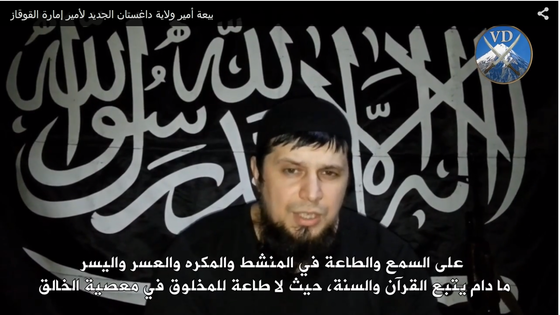
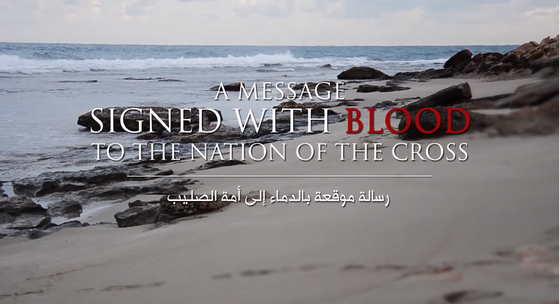
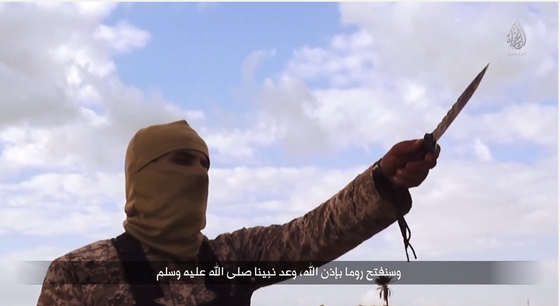
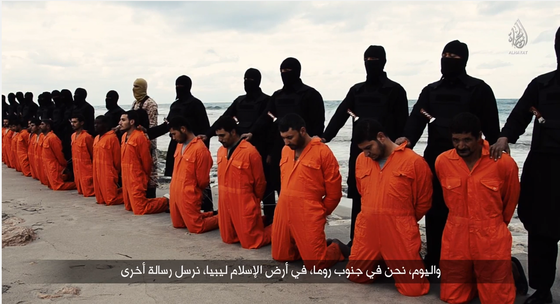
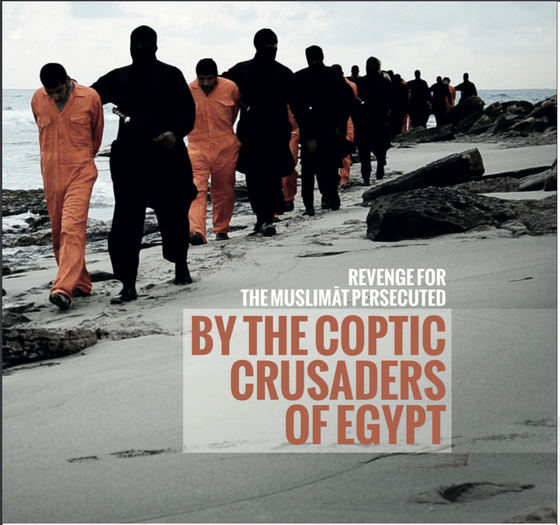
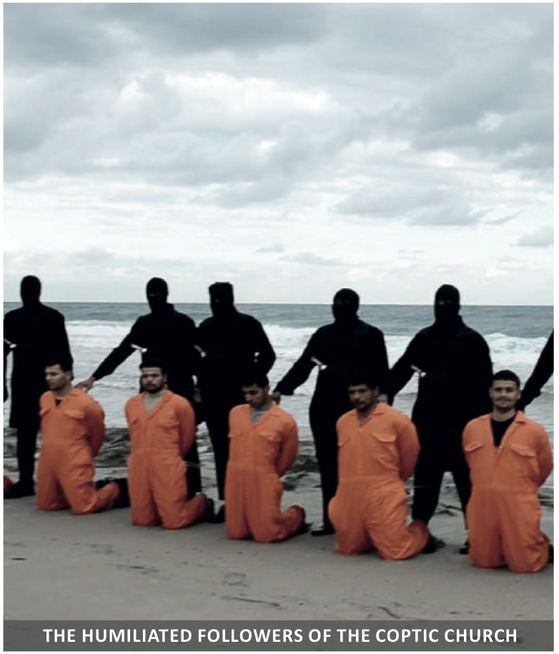






































No comments:
Post a Comment